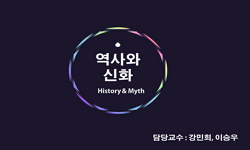Central themes of Korean theatre studies and historiography have been offered by nationalist issues such as ``Korean spirit``, ``Korean archetypes``, and ``Korean tradition.`` In this paper, I will deal with ``gender and nationalism`` in the theatre s...
http://chineseinput.net/에서 pinyin(병음)방식으로 중국어를 변환할 수 있습니다.
변환된 중국어를 복사하여 사용하시면 됩니다.
- 中文 을 입력하시려면 zhongwen을 입력하시고 space를누르시면됩니다.
- 北京 을 입력하시려면 beijing을 입력하시고 space를 누르시면 됩니다.

이윤택 민족극의 남근중심적(phallocentric) 신화 해체하기 = Deconstruction of the Phallocentric Myth displayed in Lee Youn-Taek`s Nationalist Theatre
한글로보기https://www.riss.kr/link?id=A5026476
- 저자
- 발행기관
- 학술지명
- 권호사항
-
발행연도
2007
-
작성언어
-
-
주제어
민족주의 ; nationalism와 연극 ; 유물론적 페미니즘 ; materialist feminism ; 해체 ; deconstruction ; 신화 ; myth ; 원형 ; archetype ; 이윤택 ; Lee Youn-Taek
-
KDC
600
-
등재정보
KCI등재
-
자료형태
학술저널
- 발행기관 URL
-
수록면
77-133(57쪽)
- DOI식별코드
- 제공처
- 소장기관
-
0
상세조회 -
0
다운로드
부가정보
다국어 초록 (Multilingual Abstract)
Central themes of Korean theatre studies and historiography have been offered by nationalist issues such as ``Korean spirit``, ``Korean archetypes``, and ``Korean tradition.`` In this paper, I will deal with ``gender and nationalism`` in the theatre scene of Korea, exploring these nationalist themes in Korean theatre from the perspectives of feminism. The area for this thematic examination is limited to the nationalist discourses of Korean institutional theatre in the 90s since there were significant changes in terms of international and national power dynamics around it: seemingly incompatible coexistence of globalization and nationalism and the establishment of people`s government in Korea. From the feminist point of view, my interest in interrogating the ideological performativity of the nationalist discourses in Korean theatre studies and performance has sprung from the identification of the problematic resuscitation of premodern values and principles of patriarchy regardless of political positions. Therefore, my focus falls on the theatrical discourse around playwright-director Lee Youn-Taek`s several works in that his works seem to realize the most phallocentric nationalist aesthetic and sentiment. In this essay, I try to demystify such naturalized concepts as ``nation`` and ``patriarchy.`` As many scholars point out, ``nation`` is an ``imagined community``, but the patriarchal nationalist esthetic and historiography treat ``nation`` as a substantial entity and patriarchy as a natural principal governing the relationship between women and men. But I regard patriarchal nationalist discourses and performances as myths which are constructed through archetypes, symbols, and images. Thus, in detail, I draw the meaning of Lee`s works out of the textual webs of these archetypes, symbols, and images. I assign fairly long portion of the body part of this essay to the Jungian theory of ``archetype`` which supports the transcendental and universal quality of ``national archetype`` in Lee`s works. Methodologically, I adopt the theoretical tools of ``deconstruction`` utilized by the materialist feminists through which I problematize the essentialist mode of thinking in the notion of ``national archetype`` expressed by the dichotomy of the image of ``an authoritative father and a sacrificial mother.`` Through this discursive deconstruction, I attempt to illuminate the oppressive aspect of ``the mother ideology`` worshiped and mystified by the hegemonic patriarchy encouraged by the nationalist esthetics. The themes of this essay are discussed through the theoretical considerations provided by the views of materialist feminism. First, when dealing with the dynamics of gender, I am very cautious not to make an error to understand the feminist resistance as inversion since the inverted hierarchical power structure(suggested as the oppressive women/the oppressed men) does not mean the liberative tactics of feminism. Feminism as practical liberation involves the oppressed men in a heterosexual patriarchy. Feminism does not fight with men but with authoritative patriarchs who marginalize the people of minorities. Second, the existence of the complicated historical situations and conditions demands viewing the gender politics from the intersecting points of globalization, imperialism, nationalism, and feminism. Materialist feminism does not presume that gender is the only decisive element in human relations. Rather, materialist feminists examine the material and historical situations and conditions surrounding the gender politics, involving other elements of differences: ``nationality``, ``class``, ``ethnicity``, ``sexual orientation``, ``generation``, etc. When viewing Lee`s works from this perspective, Lee`s social consciousness seems to be based on ethnic, sexual, and generational foundations intersected by the bourgeoise intelligent class identification. Third, deconstruction of phallocentric myth embedded in Lee`s works from the material
동일학술지(권/호) 다른 논문
-
한국 정방형무대의 수용과 공간특성 -한중일 비교의 관점에서-
- 한국연극학회
- 강춘애 ( Choon Ae Kang )
- 2007
- KCI등재
-
≪억척어멈과 그 자식들≫: 두 공연의 형해(形骸)로부터 건져낸 변증법적 연극논리와 양식성에 대한 소고
- 한국연극학회
- 권경희 ( Kyoung Hee Kwon )
- 2007
- KCI등재
-
현대공연예술의 수행성과 그 의미 -사건으로서의 몸과 공간-
- 한국연극학회
- 이경미 ( Kyoung Mi Lee )
- 2007
- KCI등재
-
무대 블록킹 연출: 통합적 교육 모델 개발의 필요성 -알렉산더 딘(Alexander Dean)과 앤 보거트(Anne Bogart)의 상호 보완성을 중심으로-
- 한국연극학회
- 이문원 ( Moon Won Lee )
- 2007
- KCI등재




 KCI
KCI KISS
KISS







